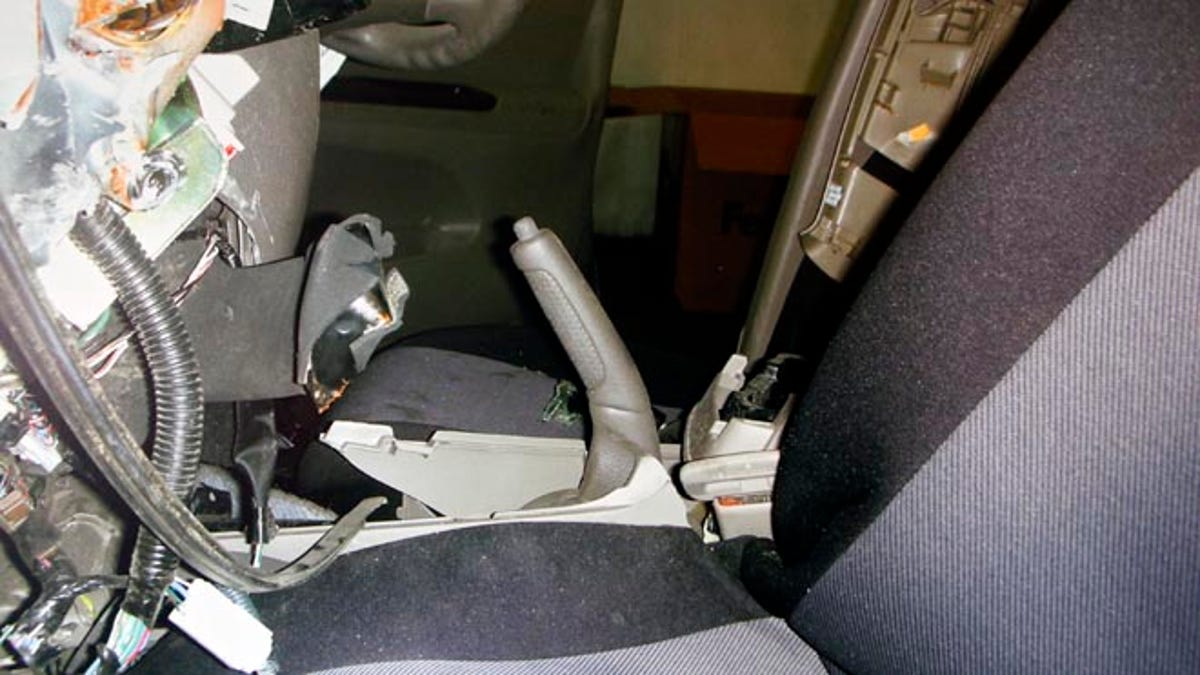
FILE - In this undated file photo displayed during a news conference by the family of the Noriko Uno, who died in an alleged "sudden unintended acceleration" auto crash in August 2009, a photo of the interior of her Toyota 2006 Camry is shown with the hand brake handle pulled all the way back. Uno's case, in which her family claims her vehicle accelerated suddenly despite her efforts, is the first headed to trial where the Japanese automaker is accused of covering up defects that led to her death. (AP Photo/Uno Family, File)
A lawyer for plaintiffs in a wrongful death lawsuit against Toyota Motor Corp. told a jury on Thursday he will ask for $20 million in damages for the family of a woman who died when her Camry suddenly accelerated and crashed despite her efforts to stop.
The case involving the 2009 death of Noriko Uno is the first involving the issue to go to trial in state court.
Toyota recalled millions of vehicles worldwide after drivers reported that some of its vehicles were surging unexpectedly. The company agreed to pay $1 billion in other suits.
In his opening statement, attorney Garo Mardirossian said Toyota was at fault for the death of Uno because it failed to install an override safety system in the 2006 model she was driving.
"Toyota made a decision to leave out the brake override system in the 2006 Camry," he said.
He also told jurors that Toyota had an obligation to warn customers what to do if an accelerator became stuck, such as placing the car in neutral.
"Owners' manuals didn't address it," he said.
Witnesses will testify that they saw Uno's car traveling at speeds up to 100 mph as it careened the wrong way down a one-way street, he said.
Toyota issued a statement at the courtroom saying the 2006 Camry had a state of the art braking system and had earned top safety and quality honors. It said an override system would not have prevented the crash.
In his opening statement, Toyota attorney Vincent Galvin told jurors the accident was not caused by any problem with the vehicle and instead was the result of driver error. He said Uno had health problems including diabetes that may have hampered her judgment after she was hit by another driver at an intersection before the crash.
"She became hypersensitive to what was going on and took off at 80 mph," Galvin said.
He contended that Uno never hit the brake, but he did not address the question of whether she tried to use the hand brake.
In his opening statement, Mardirossian showed photos of the hand brake in the "on" position.
The 2009 accident occurred in Upland, east of Los Angeles, when another driver went through a stop sign and broadsided Uno's car at slow speed. Mardirossian said the Camry spun around and started accelerating.
Uno was in control of the car and managed to avoid other drivers, including a woman with six children in her vehicle, the lawyer said, but she was unable to stop before the car hit a tree and light pole, killing her.
The trial is expected to last two months.
Legal teams, including an attorney representing the woman who hit Uno's car, said testimony will focus on evidence obtained from a "black box" recording device in the Camry which clocked Uno's car as going 28 to 30 miles per hour before she was hit. They said witnesses will include experts in biomechanics who will analyze details of the accident.
The trial's first witness, Edward Wunsch, testified that he was driving with his wife when they saw a car coming at them at a high rate of speed and the engine sounded like it was revving. He told his wife to call 911.
Wunsch estimated that the car was going 60 miles per hour when it passed him going the wrong way and, "Without a shadow of a doubt it accelerated after that. I was just glad the car went past us without hitting us."
He was unable to see the driver, he said, and was paralyzed with fright.
When Galvin asked for more details he was at a loss.
"Counselor, it happened so fast," he said. "I had this grey missile coming at me and we survived it. "